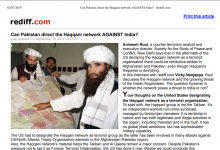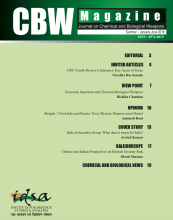-

Animesh Roul, a counterterrorism analyst and executive director, Society for the Study of Peace and Conflict, New Delhi says that in the aftermath of the US declaring the Haqqani network as a terrorist organisation there could be retributive strikes in Afghanistan and Pakistan, even though Haqqani's firepower is dwindling.
In this interview with rediff.com Vicky Nanjappa, Roul discusses the Haqqani network and the growing threat of the Indian Mujahideen. The question, however, is whether the network poses a threat to India or not?
-

It is no secret that the face of terror - the master mind - is the educated, sophisticated guy from your privileged neighbourhood. But there is a trend that increasingly portends a strong wave of political Islam in India: Even the cannon fodder is elite or middle class.
-

Ahmed Siddibaba, also known as Yasin Bhatkal, notorious for his various aliases such as ‘Saharukh Khan’, ‘Sivanand’, and ‘Dr. Imran’, is believed to be in charge of the IM terror group since the top leaders of the homegrown terror group have fled to Pakistan and to the Gulf region following countrywide crackdowns. For the first time, Yasin, the IM’s explosive expert, who facilitated terror acts but typically remained in the background, stepped into the limelight during investigations into a series of blasts that hit major urban centers such as Delhi, Bangalore, and Ahmadabad in 2008.
-

Nasiruddin Haqqani (a.k.a. Dr Khan), was born in Nika district of Paktika Province, Afghanistan sometime in the year 1972. Unlike his illustrious warlord father and notorious brothers and relatives, Nasiruddin Haqqani maintains a relatively low public profile. Yet, he has maintained a responsible position in the hierarchy.
-

To make things worse for the already stressed Islamabad administration, the hardcore Taliban factions under the banner of Tehrik-e-Talban Pakistan (TTP) reemerged from a brief period of quiescence, initiating a series of violent acts against security forces with the ultimate aim to dislodge the democratically elected government and establish a Taliban style Islamic Emirate in Pakistan. Presently, the TTP’s anger is largely directed towards the Pro-NATO/US policy of Pakistan’s government.
-

"Banning foreign defence contractors is a loss for both country and firms: Experts": Times of India, August 09, 2012
"This is a lose-lose situation for both the companies banned from bidding contracts and the country, which is heavily dependent on foreign countries for purchasing arms and defence technologies," said New Delhi-based Deba Ranjan Mohanty, who is currently the vice-president of Society for the Study of Peace and Conflict.
-

The US biodefence programme continued to remain covert until the advent of ProjectBioShield in 2003, which was pursued overtly with government sanctions. Project BioShield became a law in July 2004. Under the Project, efforts have been made to develop and make available effective drugs and vaccines to protect civilian population against any biological and chemical weapon attacks.
-

At a time when questions are being raised about Saudi Arabia’s tacit support for the global Salafist movement, recent developments have displayed the Kingdom’s new-found seriousness in fighting terrorism, especially that emanating from South Asia. These developments include the deportation of a top Lashkar-e-Taiba (LeT) operative and the detention of a wanted Indian Mujahideen (IM) suspect.
-

Afghan Taliban’s campaign against female education and empowerment is well known. This campaign reached new heights when unidentified poison attacks occurred targeting several girls schools located in Kapisa and Parwan provinces in April-May 2009. These attacks involved poisonous chemical substances and the victims had complained of headaches, nausea, vomiting, itching in the eyes following exposure. Again, in mid 2010, incidents of poisoning came to light in the Afghan capital, Kabul including in Esmati High School. Similar incidents have been noticed in 2012 as well.
-

Like other weapons of mass destruction, Chemical warfare agents (Chemical weapons-CW) have all the appalling elements which represent a serious danger to living beings at large. Countries like the US, UK, China, Russia, Iraq and Libya were the pioneers in the field of chemical weapons research and production in the world. As a matter of fact, any country which possessed a well-developed chemical industry could produce chemical agents for warfare purposes. Presently, large numbers of industrialized countries have the potential to produce a variety of chemical agents.
Paxton ported to drupal by DropThemes.in